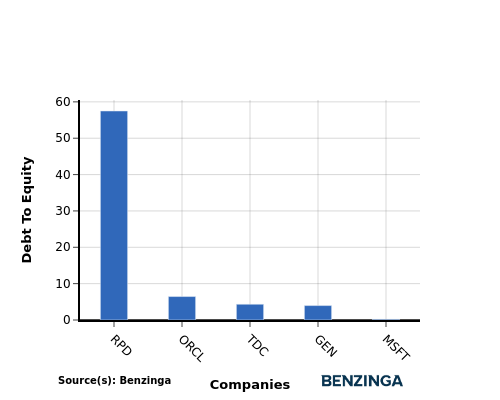In the fast-paced and highly competitive business world of today, conducting thorough company analysis is essential for investors and industry observers. In this article, we will conduct an extensive industry comparison, evaluating Microsoft MSFT in relation to its major competitors in the Software industry. Through a detailed examination of key financial metrics, market standing, and growth prospects, our objective is to provide valuable insights and illuminate company's performance in the industry.
Microsoft Background
Microsoft develops and licenses consumer and enterprise software. It is known for its Windows operating systems and Office productivity suite. The company is organized into three equally sized broad segments: productivity and business processes (legacy Microsoft Office, cloud-based Office 365, Exchange, SharePoint, Skype, LinkedIn, Dynamics), intelligence cloud (infrastructure- and platform-as-a-service offerings Azure, Windows Server OS, SQL Server), and more personal computing (Windows Client, Xbox, Bing search, display advertising, and Surface laptops, tablets, and desktops).
| Company | P/E | P/B | P/S | ROE | EBITDA (in billions) | Gross Profit (in billions) | Revenue Growth |
|---|---|---|---|---|---|---|---|
| Microsoft Corp | 33.53 | 10.22 | 11.88 | 8.17% | $36.79 | $47.83 | 12.27% |
| Oracle Corp | 43.03 | 35.81 | 9.11 | 25.66% | $5.75 | $9.97 | 8.64% |
| ServiceNow Inc | 141.52 | 20.80 | 18.37 | 4.06% | $0.62 | $2.33 | 21.34% |
| Palo Alto Networks Inc | 112.32 | 20.65 | 16.44 | 4.35% | $0.41 | $1.66 | 14.29% |
| CrowdStrike Holdings Inc | 855.18 | 35.13 | 29.16 | -0.57% | $0.05 | $0.76 | 28.52% |
| Fortinet Inc | 50.54 | 58.60 | 14.80 | 43.82% | $0.66 | $1.24 | 10.08% |
| Gen Digital Inc | 26.78 | 7.83 | 4.39 | 7.48% | $0.45 | $0.79 | 4.01% |
| Monday.Com Ltd | 496.79 | 14.91 | 16.61 | 2.3% | $-0.02 | $0.23 | 6.76% |
| CommVault Systems Inc | 48.65 | 28.26 | 8.86 | 3.9% | $0.02 | $0.21 | 21.13% |
| Dolby Laboratories Inc | 30.49 | 3.16 | 6.09 | 2.72% | $0.11 | $0.32 | 13.13% |
| QXO Inc | 22.95 | 1.18 | 20.91 | -0.21% | $-0.03 | $0.01 | -2.0% |
| Qualys Inc | 29.98 | 10.69 | 8.57 | 9.49% | $0.05 | $0.13 | 3.46% |
| SolarWinds Corp | 28.61 | 2.24 | 4.01 | 5.26% | $0.07 | $0.19 | 6.14% |
| Progress Software Corp | 36.73 | 5.59 | 3.34 | 0.27% | $0.05 | $0.18 | 21.47% |
| Teradata Corp | 20.60 | 17.20 | 1.34 | 19.38% | $0.08 | $0.27 | -7.05% |
| Rapid7 Inc | 81.70 | 116.63 | 2.45 | 38.08% | $0.03 | $0.15 | 0.75% |
| Average | 135.06 | 25.25 | 10.96 | 11.07% | $0.55 | $1.23 | 10.04% |
By thoroughly analyzing Microsoft, we can discern the following trends:
-
The stock's Price to Earnings ratio of 33.53 is lower than the industry average by 0.25x, suggesting potential value in the eyes of market participants.
-
With a Price to Book ratio of 10.22, significantly falling below the industry average by 0.4x, it suggests undervaluation and the possibility of untapped growth prospects.
-
With a relatively high Price to Sales ratio of 11.88, which is 1.08x the industry average, the stock might be considered overvalued based on sales performance.
-
The Return on Equity (ROE) of 8.17% is 2.9% below the industry average, suggesting potential inefficiency in utilizing equity to generate profits.
-
The company has higher Earnings Before Interest, Taxes, Depreciation, and Amortization (EBITDA) of $36.79 Billion, which is 66.89x above the industry average, indicating stronger profitability and robust cash flow generation.
-
The gross profit of $47.83 Billion is 38.89x above that of its industry, highlighting stronger profitability and higher earnings from its core operations.
-
With a revenue growth of 12.27%, which surpasses the industry average of 10.04%, the company is demonstrating robust sales expansion and gaining market share.
Debt To Equity Ratio

The debt-to-equity (D/E) ratio is a financial metric that helps determine the level of financial risk associated with a company's capital structure.
Considering the debt-to-equity ratio in industry comparisons allows for a concise evaluation of a company's financial health and risk profile, aiding in informed decision-making.
By analyzing Microsoft in relation to its top 4 peers based on the Debt-to-Equity ratio, the following insights can be derived:
-
Compared to its top 4 peers, Microsoft has a stronger financial position indicated by its lower debt-to-equity ratio of 0.21.
-
This suggests that the company relies less on debt financing and has a more favorable balance between debt and equity, which can be seen as a positive attribute by investors.
Key Takeaways
For Microsoft in the Software industry, the PE and PB ratios suggest the stock is undervalued compared to peers, indicating potential for growth. However, the high PS ratio implies the stock may be overvalued based on revenue. In terms of ROE, EBITDA, gross profit, and revenue growth, Microsoft shows strong performance, outperforming industry peers and indicating a healthy financial position for future growth.
This article was generated by Benzinga's automated content engine and reviewed by an editor.
Edge Rankings
Price Trend
© 2025 Benzinga.com. Benzinga does not provide investment advice. All rights reserved.
Trade confidently with insights and alerts from analyst ratings, free reports and breaking news that affects the stocks you care about.